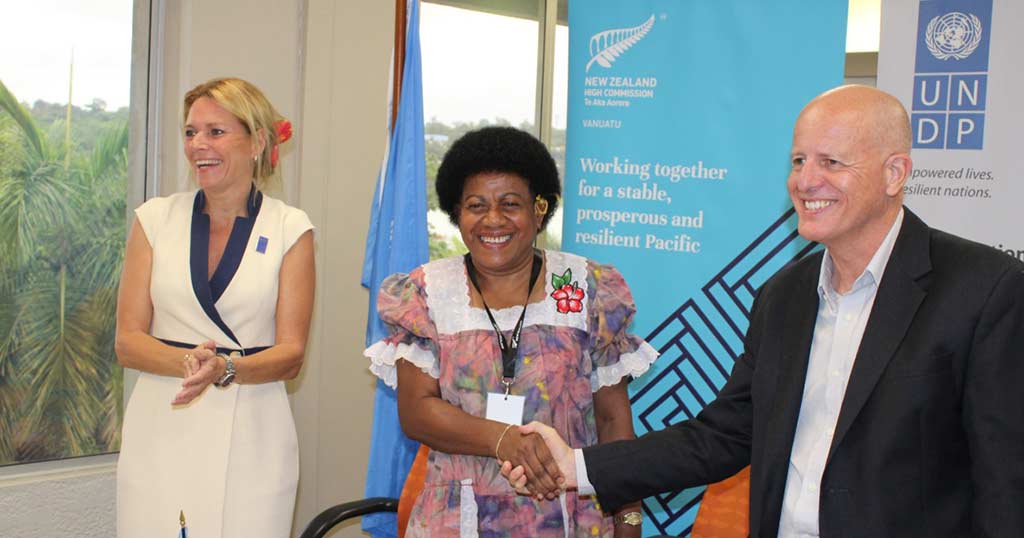Port Vila, Vanuatu – The New Zealand Government and the United Nations Development Programme signed a new three and a half year electoral project that will provide crucial technical and financial assistance to the electoral authorities in Vanuatu till the next general election in 2024.
The funding assistance of 5 million NZD will boost the current electoral project implemented by UNDP into phase two of the Vanuatu Electoral Environment Project (VEEP-II) which will begin in January 2021.
The new phase will scale up efforts to increase the reach of the national Identification (ID) card, as well as the transition to a new voter registration model with increased accuracy and integrity based on the national ID, the institutuional strengthening of electoral authorities both at central and provincial levels, strengthen the ability to conduct voter education and raise public awareness, and support electoral reforms.
The Chairman of Electoral Commission, Edward Kaltamat, stressed “the relevance of all four outputs of VEEP-II. In particular, I want to highlight the importance of the transition to the use of the national ID card in future elections. Once the transition will be completed, the electoral rolls will be extracted from the Civil Registry database.”
He added, A comprehensive data cleaning exercise and field validation the data of the voter lists is currently ongoing. The new rolls will massively improve voters’ turnout data, as well as increase the trust in the electoral processes and the credibility of the election results.”
The.electoral authorities are ready to consolidate what has been done and learnt so far to deliver better services to voters and citizens. UNDP and New Zealand are keen to support democratic processes in Vanuatu. Engagement is the first ingredient of success.
Foreign Affairs Minister Hon Nanaia Mahuta said in her official announcement, “This project, valued at $5 million over the next four years, will help the Vanuatu Electoral Office to improve voter enrolment and the quality of the voter roll, and enhance public confidence in the electoral system.
“New Zealand and Vanuatu share a commitment to democracy and free and fair elections. We are proud to be working with the UNDP and the Vanuatu electoral authorities to deliver the VEEP project,” she added.
New Zealand’s High Commissioner, H.E. Jonathan Schwass said, “New Zealand has been working with UNDP and the Vanuatu Electoral Office since 2018, to strengthen the capacity of the electoral authorities. After the successful implementation of VEEP we are proud of the results achieved and keen to support another phase of this UNDP initiative. We look forward to UNDP and NZ consolidating lessons learnt in the 2020 general elections to further strengthen electoral processes in Vanuatu.”
The UNDP Pacific Office in Fiji, Resident Representative, Levan Bouadze, said, “Vanuatu is one of the first countries in the Pacific to introduce an ID card to its citizens, despite limited resources, very complicated geography and some areas with very limited access to information.”
“This is a tremendous achievement for both the Department of Civil Registry and Vital Statistics and the Vanuatu Electoral Office. At the same time, it is a significant cost-saving measure for the Government and an essential begin of having accurate population statistics to identify appropriate strategic responses to development challenges. We are happy to continue working on consolidating results already achieved through VEEP phase I (2017-2020) and address issues identified in the March general election. We are ready to provide assistance to any electoral reform measures that may be considered relevant by the electoral stakeholders,” said Boudadze.
The Department of Civil Registry and Vital Statistics of the Ministry of Internal Affairs will be a new partner of the project, along with the Electoral Commission. VEEP-II will also focus on the findings of the first-ever nationwide post-electoral review which evaluated the 2020 general election. It aims at broadening the partnership of the electoral authorities with the Civil Society Organisations to increase electoral awareness to citizens.
